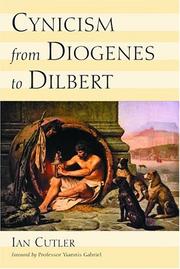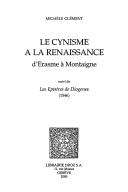| Listing 1 - 4 of 4 |
Sort by
|

ISBN: 0786420936 Year: 2005 Publisher: Jefferson, N.C. : McFarland & Company,
Abstract | Keywords | Export | Availability | Bookmark
 Loading...
Loading...Choose an application
- Reference Manager
- EndNote
- RefWorks (Direct export to RefWorks)
"The book focuses on significant periods of historical change, such as the Renaissance, and the historical cynics responsible for several seminal social ideas, including cosmopolitanism, asceticism, and parrhesia. The author claims that aspects of Greek cynicism are present in contemporary society, offering a positive strategy for living in a hostile world"--Provided by publisher. Cynisme door de eeuwen heen, van Socrates ... tot de Benny Hill Show!
Book
ISBN: 193267411X Year: 2005 Publisher: 台北 博大出版社
Abstract | Keywords | Export | Availability | Bookmark
 Loading...
Loading...Choose an application
- Reference Manager
- EndNote
- RefWorks (Direct export to RefWorks)
Cynicism --- Social aspects --- China --- Intellectual life --- Politics and government

ISBN: 2600009728 9782600009720 Year: 2005 Volume: 9 72 Publisher: Genève: Droz,
Abstract | Keywords | Export | Availability | Bookmark
 Loading...
Loading...Choose an application
- Reference Manager
- EndNote
- RefWorks (Direct export to RefWorks)
History of civilization --- anno 1400-1499 --- anno 1500-1599 --- Cynics (Greek philosophy) --- Cynicism in literature --- European literature --- Cyniques (Philosophie grecque) --- Cynisme dans la littérature --- Littérature européenne --- Influence --- Diogenes, --- Cynics (Greek philosophy) in literature. --- Humanism --- History --- Cynisme dans la littérature --- Littérature européenne --- Literary studies --- 16th century --- Cynicism --- Cynic (Greek philosophy) --- Cynicism (Greek philosophy) --- Philosophy, Ancient --- European literature - Renaissance, 1450-1600. --- Humanism - Europe - History - 16th century. --- RABELAIS (FRANCOIS), ECRIVAIN FRANCAIS, 1494-1553 --- MONTAIGNE (MICHEL EYQUEM DE), ECRIVAIN FRANCAIS, 1533-1592 --- DIOGENE LE CYNIQUE, PHILOSOPHE GREC, VERS 413-327 AV. J.C. --- CYNISME --- PHILOSOPHIE DANS LA LITTERATURE --- LITTERATURE FRANCAISE --- CRITIQUE ET INTERPRETATION --- RENAISSANCE --- 16E SIECLE --- HISTOIRE ET CRITIQUE

ISBN: 9401201137 142379138X 9781423791386 9789401201131 9042016078 9789042016071 Year: 2005 Publisher: Amsterdam New York, NY Rodopi
Abstract | Keywords | Export | Availability | Bookmark
 Loading...
Loading...Choose an application
- Reference Manager
- EndNote
- RefWorks (Direct export to RefWorks)
Contemporary feminist theorists have implied a special affinity between women and irony because of their 'double' relation to the prevailing order of things: both speak from within this order while remaining 'other' to it in some way. Irony can be regarded as the obvious mode in which a feminist might speak, as it reflects her relation to the patriarchal structure while refusing to validate the truth of the current sexual hierarchy. She Changes by Intrigue undertakes the first sustained analysis of the parallels between irony, femininity and feminism. By retracing the association of these terms through canonical and contemporary continental philosophy, the book seeks to illuminate a notion of sexual agency that has until now remained shadowy, in spite of its prevalence. Examining the recurrence of the 'ironic feminine' in texts by Kristeva, Hegel, Kierkegaard, Irigaray, Derrida and Kofman, it argues that a radical revaluation of the legacy of patriarchal thought in feminism is necessary before irony can be embraced as a feminist strategy. In this context, She Changes by Intrigue offers a new reading of what it means to write as a feminist 'subject'. This volume will be of interest to students and academics working in the fields of gender studies, continental philosophy and critical / cultural theory.
Femininity (Philosophy) --- Femininity in literature. --- Feminist theory. --- Irony. --- Sarcasm --- Cynicism --- Rhetoric --- Satire --- Tragic, The --- Understatement --- Feminism --- Feminist philosophy --- Feminist sociology --- Theory of feminism --- Femininity (Psychology) in literature --- Philosophical anthropology --- Philosophy --- 82:396 --- 82:396 Literatuur en feminisme --- Literatuur en feminisme
| Listing 1 - 4 of 4 |
Sort by
|

 Search
Search Feedback
Feedback About UniCat
About UniCat  Help
Help News
News